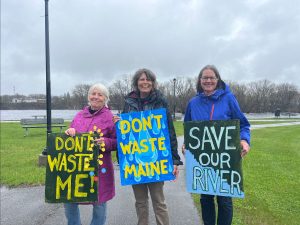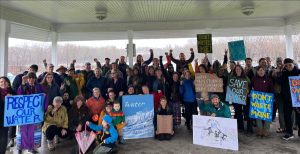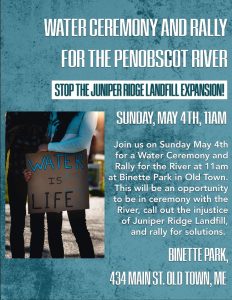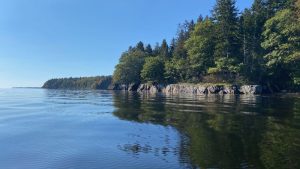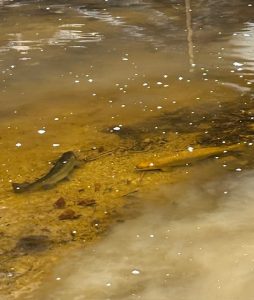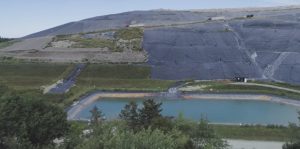On the heels of the Land Use Planning Commission’s February rejection of a metallic mining project within Maine, the state’s legislative Committee on Environment and Natural Resources is now poised to back track environmental protections in the state’s mining rules. The ENR will not hold a public hearing, but public comments will be accepted at a work session at 1pm Monday, March 25, 2024 at the Statehouse Rm 216.[See Resist Maine Mining’s reporting and action alert below]

URGENT ACTION ALERT
Committee on Environment and Natural Resources Poised to Weaken Maine’s Mining Law at the Expense of Human Health and Water Protections
Email your representatives, ENR Committee, and submit comment in person / online
Please take action against an undemocratic move to weaken Maine’s mining law by writing to your legislators and ENR committee members before the work session on LD1471 at 1 pm on Monday, March 25. Submit comment in advance and attend in person or online.
On Monday, March 25, the Maine legislature’s Committee on Environment and Natural Resources (ENR) will discuss a new “Zombie Bill” version of LD1471, a bill that was tabled last year. This bill takes a dangerous U-turn on environmental protections for metallic mining in Maine. This new version of LD1471 replaces language about strengthening environmental and human health mining protections with language that instead weakens Maine’s mining law and creates a loophole that specifically exempts open-pit lithium mining from environmental protections in the law.
Writing a “Zombie Bill” is sneaky, undemocratic politics. The Maine Board of Environmental Protection (BEP) missed the deadline for this legislative session to have the legislature review these new rules regarding open-pit lithium mining. Instead of going through a transparent, democratic process of review in the next legislative session, the Mills administration, pushed by the mining industry and in cooperation with the ENR committee, is bringing this zombie bill forward in an attempt to rush it through without a public hearing.
We deserve the right to a public hearing and to submit testimony on this legislation, but this undemocratic process takes away our right to do so. There is no online portal available to submit testimony, so please submit comment by email or in person.
- In advance of the March 25th 1pm LD1471 work session, submit comment to the Legislature’s ENR (Environment and Natural Resources) Committee:
“If you would like to provide comment on these matters in person, please bring 20 copies of any written materials to the meeting tomorrow for distribution. If you would like to provide comment remotely, you can request a Zoom attendance link and submit any written materials by emailing the ENR Committee Clerk, Marianne MacMaster ([email protected]). If you just want to submit written materials and do not want to provide in person or remote comment, you can email those materials to Marianne as well.”
In addition to writing the clerk at [email protected] we also recommend copying your comment to the ENR committee members directly for redundancy:
[email protected], [email protected], [email protected], [email protected], [email protected], [email protected], [email protected], [email protected], [email protected], [email protected], [email protected], [email protected], [email protected], [email protected]
- ADDITIONALLY send your comment to your personal State Representatives and Senator: Find their contact info here
Attend and submit comment in person or online. The LD1471 work session is happening on Monday, March 25th at 1pm in the Cross Building, Room 216 at the Augusta Statehouse. A link for attending and commenting online can be requested by emailing [email protected]
SCRIPT
Write your own comments or use the script below:
“Dear Representative [NAME], OR Dear Members of the Joint Standing Committee on Environmental and Natural Resources,
I am writing to comment in opposition of the proposed amendment to LD 1471. This amendment completely undermines the original purpose of LD 1471, which is to provide human health and safety protections to Maine mining operations. The amendment seeks to weaken Maine’s existing Chapter 200 mining regulations and provides an exemption for open-pit lithium mining. The decision to fast-track the Chapter 200 resolve with an emergency clause while simultaneously removing from consideration the original purpose of LD 1471 is a dangerous threat to Maine’s human safety, environment, and natural resources.
I urge you to vote “NO” and reject the proposed amendment to LD 1471. It is imperative to preserve the original language of LD 1471. I urge you to consider the original text and intention of LD 1471, as proposed by Senator Bennett, which strengthens environmental and public health protections for mining in Maine.
Additionally, the Board of Environmental Protection missed the submission deadline to allow a proper public hearing on the matter of changing Chapter 200’s regulations. Lack of a public hearing and comment period regarding a decision with such significant impact to Maine’s residents and environment is an affront to our democratic process and weakens our confidence that the state is exercising due diligence in this consequential matter. I urge you to seek public comment and schedule a public hearing, with adequate advance notice, for any and all alterations to Maine’s Chapter 200 mining regulations.
Sincerely, [YOUR NAME, YOUR TOWN]”
Think Maine has the toughest mining laws around? Think again!
The much touted Chapter 200 rules actually state “contamination of groundwater from activities permitted under this Chapter may occur within a mining area.” It also explicitly exempts acidity and metal pollution—including arsenic, mercury, and lead from regulation. Wisconsin’s Act 171 the “Prove It First Law” was a much more stringent regulation than Maine’s Chapter 200 rule.
Additionally, changes made to Mining regulations in 2012 consisted of completely removing the Land Use Planning Commission (LUPC) from its previous role in the permitting process, shifting its oversight to zoning. Companies would now only need to acquire one permit through the state Department of Environmental Protection. Other previously required permits were removed as well, including a Site Law permit, a Solid Waste Management Act permit, and a state stormwater permit. Required permits would now be processed by the DEP in a consolidated fashion.
In 2012 permit term limits were also removed from the process, a huge boon for the industry. No longer would companies be required to renegotiate permits on an annual basis; instead, they would be allowed to retain their original permit for the lifetime of the mine. The re-permitting process was a critical safety measure, ensuring potential mining projects would be recurrently subjected to state scrutiny, allowing for identification and response to (inevitable) environmental and safety threats. Our waters are more precious than their gold!
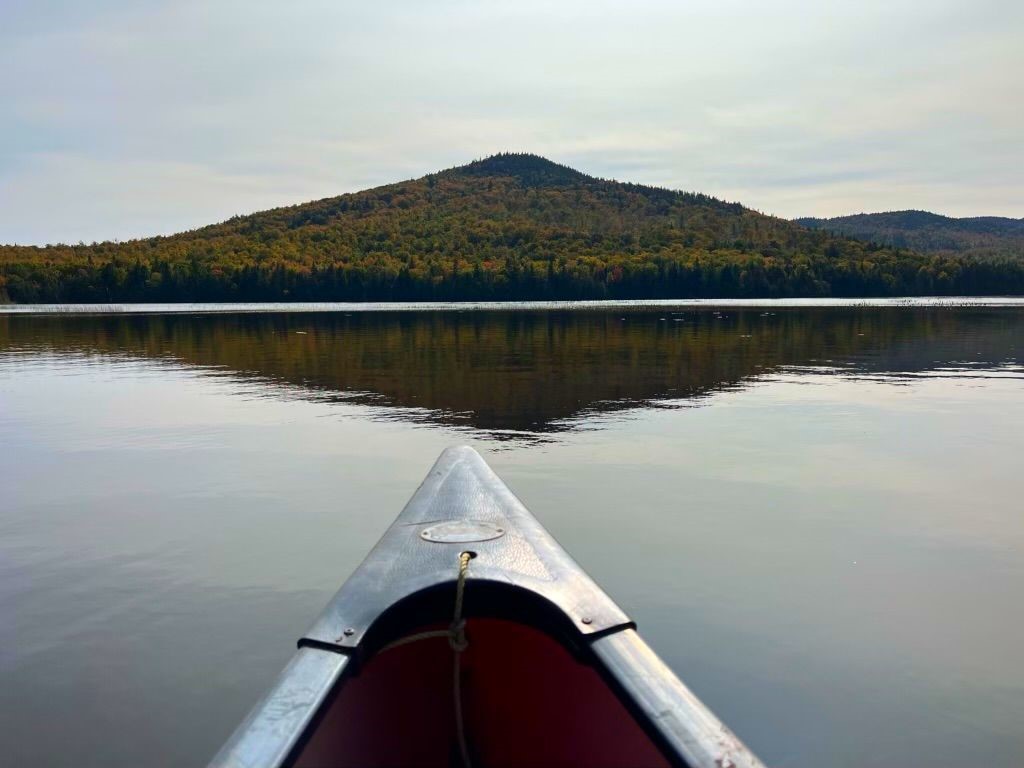
WOLFDEN MINING REJECTED!!
PENOBSCOT NATION AND MALISEET BLOCK DESTRUCTION OF WATER AND FISH HABITATS
On February 14th, the Maine Land Use Planning Commission (LUPC) rejected Wolfden Mining’s application to rezone 374 acres in the Katahdin region to allow for metallic mining. The proposed Pickett Mountain mine site was at the headwater tributaries of the Penobscot River and in proximity to water bodies critical to Atlantic Salmon, Brook Trout and recognized sustenance fishing areas. Acid mine drainage pollution threatened to irreversibly impact water, fish and Wabanaki culture.
The Penobscot Nation and the Houlton Band of Maliseets opposed Wolfden Mining as intervenors in the LUPC process. The Commission’s decision read in part:“the Commission finds the proposed rezoning would have an undue adverse impact on water resources, fisheries, and aquatic life because there is credible evidence in the record that shows a significant risk of adverse impacts to these resources from acid rock drainage and potential spills of hazardous materials, and the risk is too great given the high value of those resources.”

